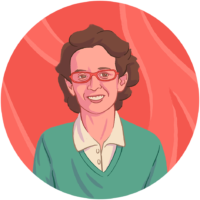What I Wish I Knew When I Was Diagnosed With IBD
"I have what . . . ?" Some IBD diagnoses come as a shock. Perhaps you had never even heard of Crohn's or colitis before you were diagnosed. Or maybe you had always had a clean bill of health and never considered the possibility of being diagnosed with a chronic condition down the road.
"Thank goodness I have answers." On the other hand, maybe you had been experiencing symptoms for a long time without any explanation. Perhaps this diagnosis came with some relief. You finally understood what had been causing your ongoing pain or discomfort.
No matter how you felt when you first received this life-altering news, you probably know some things now that you wish you had known then. And there are probably things you've learned over the course of your IBD journey that a newly diagnosed person could benefit from.
So we asked our advocates: What do you wish you knew when you were diagnosed that you know now?
Just diagnosed with Crohn's or UC: What I wish I knew then . . .

"I wish I knew how strong my illness would make me. I was so focused on all the horrible things that could happen in the future that I never considered how my UC would teach me how to handle something so debilitating with grace. I never considered that it would show me how to extend more empathy and understanding toward others. I never considered that it would help me cultivate relationships of kindness and support with others and that I would find a community of others who suffer, too. I never considered that it would turn me into an advocate for disability justice. I hope anyone who is facing diagnosis now knows that though it isn't easy to have a chronic illness, especially one that others might classify as embarrassing, it is the kind of life event that will shape them and show them even more truths about the world." –Eshani
"You are not alone. I was diagnosed before social media, and no one I knew had ever heard of Crohn’s let alone known anyone with it. I became an introvert because of my illness. I wanted to just hide away and even tried suicide at one point (pills). Now with social media, there are hundreds of different platforms and forums with thousands and thousands of people, young and old, around the world with IBD or who know someone with IBD and understand what you're going through. Having a good support network is one of the best ways to help in dealing with the disease." –Vern
"I wish someone with experience had offered me advice about navigating ulcerative colitis. I was only 19 years old when I was diagnosed with UC. Today, at age 52, I know better because experience has been a 'good' teacher. Here’s the advice I offer anyone newly diagnosed with UC: First and foremost, be good and kind to yourself. Remove all stressors from your environment. Find ways to 'relax.' A relaxed body is better equipped to deal with a flare. Watch what you eat. It's common sense, but what goes in must come out. So be picky about food choices. I have learned what foods I can and cannot eat during a flare-up. Experience has taught me to adjust my diet in times of need. Find a good doctor – one who will truly listen to you. Each body is different, so medication that works for one person may not work for you. So, be patient as you navigate the medicinal path. But also become a good researcher. Only within the past decade have I realized the value of researching different methods and techniques for treating UC. You'll always have this disease. So, embrace your UC dragon (that’s my term of 'endearment') and then find ways to live with it that are most comfortable for you and your lifestyle." –Traci
"While ulcerative colitis is a chronic condition, in a sense it's not permanent. What I mean by that is that symptoms change, and how you feel will, too. When I was in my worst flare, it felt like things would never get better and that I would have to live that way forever. The thought of that was unbearable at times. Now that I've had UC for several years, though, I've become more aware of how the disease is constantly changing. There are good days and bad days; there are flares and periods of remission. It can be so hard to keep that hope for something better when you're in the midst of a flare-up, but being able to make it through flares and get to the other side has given me a broader perspective on my illness. I can recognize the fluctuations and see the early warning signs of a flare far better than I was able to when I was first diagnosed. I also have the strength of knowing that I’ve made it through flares before when it felt like I wouldn’t make it. That has been a truly empowering feeling and has made me feel more confident in my ability to handle other ups and downs in life!" –Christal
"One thing I wish I knew when my son was first diagnosed was that our lives wouldn’t have to be consumed by his illness. As relieved as I was to have a cause for his weight loss and pain, I thought that my son having Crohn's meant that every waking moment from then on would be spent tending to his health. I thought there wouldn't be time for anything other than taking him to the doctor, reading IBD forum posts, and monitoring his food intake and trips to the bathroom. But while Crohn's is never far from my mind, we've been lucky that my son found a regimen that worked for him, and he is in remission. During non-pandemic times, he still goes to school and to the movies and out to dinner – though we are strict with his gluten-free diet. We still travel. He still gripes about this and that like most young people. I know that we are extremely lucky. I also know that the situation could change at any time. Nothing's guaranteed. But I also think, 8 years in, that I would have more perspective should he have a recurrence. I'd be an even better advocate for him, too, because I’m more knowledgeable about the disease and his pattern of symptoms now. I know which questions to ask and that the first treatment mentioned is not the one I must agree with. When my son first got sick, I was terrified he wouldn't have much of a life. Now I'm confident that isn’t true." –Jennifer, caregiver
Share your experiences
What do you know now that you wish you had known when you were first diagnosed with IBD? What have you learned during your journey with Crohn's or colitis that you can share with someone just starting theirs? Share in the comments below or in our forums.
Join the conversation